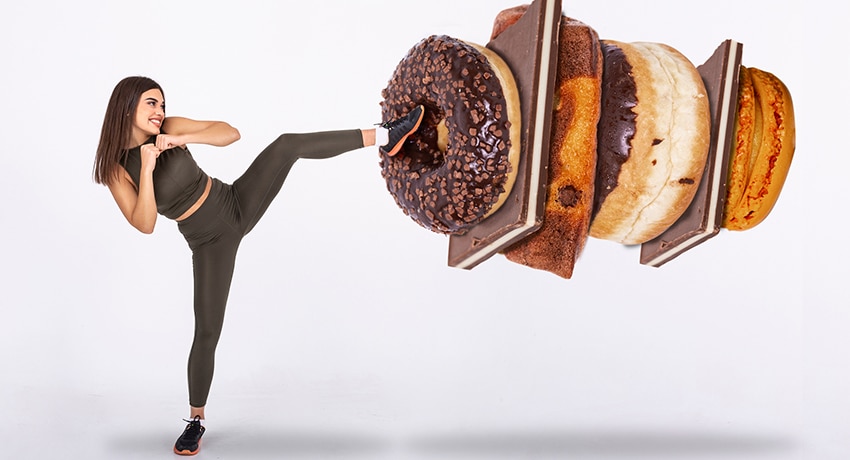Americans are eating and drinking too many added sugars, according to the Centers for Disease Control and Prevention. Added sugars are sweet-tasting carbohydrates added to food or beverages either during processing or right before consumption.
In 2017-18, American adults ages 20 and older consumed an average of 17 teaspoons of added sugar each day. The average was the same for children and young adults ages 2 to 19.

Though food and beverages with added sugars can be consumed in moderation, too much can lead to poor nutrition as well as potential health problems, according to Tish J. Wright, RD, certified diabetes educator with UT Physicians Multispecialty – Bayshore.
“Our bodies actually don’t need any added sugars. We can get enough from fructose and lactose. These are the natural sugars from fruit and dairy,” Wright said. “Added sugars have no fiber or no vitamins and minerals. They’re just empty calories. If you’re eating too many things like sweet pastries, dairy desserts, candies, or rich, flavored coffees, your body probably isn’t getting all the nutrients it needs for optimal health.”
Too many added sugars may also lead to more serious health conditions.
“If your daily diet consists of too many added sugars that your body isn’t burning off, it may lead to obesity,” Wright said. “Obesity is linked to Type 2 diabetes and even heart disease. To prevent potential health problems later, it’s best to limit your added sugars and eat sugary snacks and drinks occasionally rather than regularly.”
Parents, especially, should limit the added sugar in their children’s diet.
“If adults are consuming too much added sugar, then most kids are definitely consuming too much for their size. Kids need a healthy start so it’s best to keep it very low,” Wright said.
Wright believes the reason for America’s sugar habit is twofold.
“Part of the problem is most people don’t realize how many added sugars are in most foods. The other part is that added sugars can be somewhat addicting. Sugar cravings are very common,” she said. “With a little knowledge, though, people can be more aware of all the sugars they take in and cut much of it from their diets.”
The registered dietitian offers six ways to help kick the sugar habit.
Keep count
In general, try to limit added sugars to 6 teaspoons a day for women and 9 teaspoons a day for men. It is best to not introduce added sugars to young children.
“Remember that 4 grams of sugar equals about 1 teaspoon. Follow this rule of thumb to help you when you start looking up the amount of added sugar in your foods. Just a little basic math will help you keep count of your daily sugar intake,” Wright said.
Read food labels
Check the labels on all processed foods to see the grams of added sugar it contains.
“We know a bag of cookies is going to have sugar, but there are so many other shelf foods that are full of sneaky sugars,” Wright said. “Many condiments, for instance, have lots of sugar — things like ketchup, barbecue sauce, and some Asian sauces. It’s not that you can never eat foods with high sugar, just be aware of how it impacts your limit.”
Drink less sugar
So much added sugar is not necessarily chewed but gulped. It can come from types of beverages, including energy drinks, sodas, and flavored coffees.
“Just a single 12-ounce soda can already put many people over the daily limit. Even though it’s liquid, it still counts,” she said. “Also, limit fruit juice. Even though 100% fruit juice contains natural sugars, it still has high calories and it’s best to dilute it with some water. Water is still the best drink with no carbs or calories. Milk is another option.”
Limit sugar for kids
Do not serve children treats with added sugars, such as ice cream, cake, or fruit-flavored drinks. They will be introduced to treats soon enough as they attend birthday parties and other social events.
“Kids really should not be eating any sugar, especially if they’re under 2. If you introduce something sweet, don’t let it be candies. Let it be fruit,” Wright said. “Also, remember a kid’s portion should be much smaller than an adult’s portion. A piece of cake for a child, for instance, should be half of what you serve an adult, and the proper portion size for an adult is only 2 inches by 2 inches.”
Trick the cravings
When sugar cravings hit, immediately do something to distract the brain.
“Many times we want something sweet when we’re very relaxed, or stressed. When this happens, find something to take your mind off the craving,” Wright said. “A good way is to brush your teeth. You can turn that craving into a signal to brush your teeth. You can also start exercising or reading or drinking water. These tricks may also help you from overeating. If you still want something sweet, then eat fruit.”
Try sugar substitutes
It is better to reduce added sugars, not replace them. However, those who need a spoonful of sugar in their daily coffee or tea can try natural sugar substitutes, such as stevia and monk fruit sweeteners.
“These types of sugar substitutes have zero carbohydrates and calories, and they pack a lot of sweetness in fewer grams,” she said. “These may be a better choice for people who want to watch their weight, and they can even be used for baking.”


